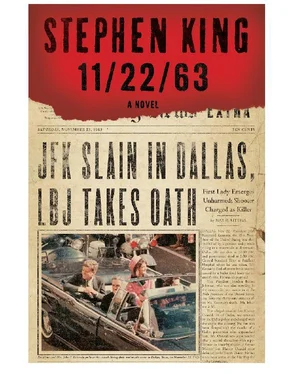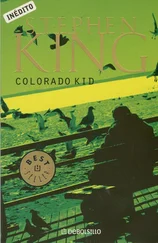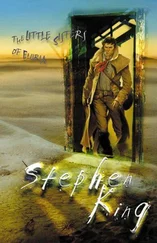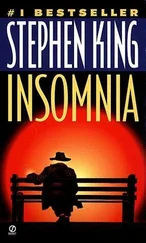Stephen King - 11/22/63 - A Novel
Здесь есть возможность читать онлайн «Stephen King - 11/22/63 - A Novel» весь текст электронной книги совершенно бесплатно (целиком полную версию без сокращений). В некоторых случаях можно слушать аудио, скачать через торрент в формате fb2 и присутствует краткое содержание. Жанр: Альтернативная история, Триллер, на английском языке. Описание произведения, (предисловие) а так же отзывы посетителей доступны на портале библиотеки ЛибКат.
- Название:11/22/63: A Novel
- Автор:
- Жанр:
- Год:неизвестен
- ISBN:нет данных
- Рейтинг книги:4 / 5. Голосов: 2
-
Избранное:Добавить в избранное
- Отзывы:
-
Ваша оценка:
- 80
- 1
- 2
- 3
- 4
- 5
11/22/63: A Novel: краткое содержание, описание и аннотация
Предлагаем к чтению аннотацию, описание, краткое содержание или предисловие (зависит от того, что написал сам автор книги «11/22/63: A Novel»). Если вы не нашли необходимую информацию о книге — напишите в комментариях, мы постараемся отыскать её.
11/22/63: A Novel — читать онлайн бесплатно полную книгу (весь текст) целиком
Ниже представлен текст книги, разбитый по страницам. Система сохранения места последней прочитанной страницы, позволяет с удобством читать онлайн бесплатно книгу «11/22/63: A Novel», без необходимости каждый раз заново искать на чём Вы остановились. Поставьте закладку, и сможете в любой момент перейти на страницу, на которой закончили чтение.
Интервал:
Закладка:
Eyes closed, I took one more step, and heard that weird popping sound inside my head. I opened my eyes. I was in a small, filthy bathroom. There was no toilet; it had been removed, leaving nothing but the dirty shadow of its footing. An ancient urine-cake, faded from its bright blue operating color to a listless gray, lay in the corner. Ants marched back and forth over it. The corner I’d come out in was blocked off by cartons filled with empty bottles and cans. It reminded me of Lee’s shooter’s nest.
I pushed a couple of the boxes aside and eased my way into the little room. I started for the door, then restacked the cartons. No sense making it easy for anyone to stumble down the rabbit-hole by mistake. Then I stepped outside and back into 2011.
7
It had been dark the last time I’d gone down the rabbit-hole, so of course it was dark now, because it was only two minutes later. A lot had changed in those two minutes, though. I could see that even in the gloom. At some point in the last forty-eight years, the mill had burned down. All that remained were a few blackened walls, a fallen stack (that reminded me, inevitably, of the one I’d seen at the site of the Kitchener Ironworks in Derry), and several piles of rubble. There was no sign of Your Maine Snuggery, L.L. Bean Express, or any other upscale shops. Here was a wrecked mill standing on the banks of the Androscoggin. Nothing else.
On the June night when I’d left on my five-year mission to save Kennedy, the temperature had been pleasantly mild. Now it was beastly hot. I took off the sheepskin-lined coat I’d bought in Auburn and tossed it into the ill-smelling bathroom. When I closed the door again, I saw the sign on it: BATHROOM OUT OF
ORDER! NO TOILET!!! SEWER PIPE IS BROKEN!!!
Beautiful young presidents died and beautiful young presidents lived, beautiful young women lived and then they died, but the broken sewer pipe beneath the courtyard of the old Worumbo mill was apparently eternal.
The chain was still there, too. I walked to it along the flank of the dirty old cinderblock building that had replaced the drying shed. When I ducked under the chain and went around to the front of the building, I saw it was an abandoned convenience store called Quik-Flash. The windows were shattered and all the shelves had been taken away. The place was nothing but a shell where one emergency light, its battery almost dead, buzzed like a dying fly against a winter windowpane. There
was graffiti spray-painted on the remains of the floor, and just enough light to read it: GET OUT OF TOWN YOU PAKI BASTARD.
I walked across the broken concrete of the courtyard. The lot where the millworkers had once parked was gone. Nothing had been built there; it was just a vacant rectangle filled with smashed bottles, jigsaw chunks of old asphalt, and listless clumps of trash grass. Used condoms hung from some of these like ancient party-streamers. I looked up for stars and saw none. The sky was covered with low-hanging clouds just thin enough to allow a little vague moonlight to seep through. The blinker at the intersection of Main Street and Route 196 (once known as the Old Lewiston Road) had been replaced at some point by a traffic light, but it was dark. That was all right; there was no traffic in either direction.
The Fruit was gone. There was a cellar-hole where it had stood. Across from it, where the greenfront had been in 1958 and where a bank should have been standing in 2011, was something called Province of Maine Food Cooperative. Except these windows were also broken, and any goods that might have been inside were long gone. The place was as gutted as the Quik-Flash.
Halfway across the deserted intersection, I was frozen in place by a great watery ripping sound. The only thing I could imagine making a noise like that was some kind of exotic ice-plane, melting even as it broke the sound barrier. The ground beneath my feet briefly trembled. A car alarm blurped, then quit. Dogs barked, then fell silent, one by one.
Earthquake in Los Angle-ees, I thought. Seven thousand dead.
Headlights splashed down Route 196, and I made it to the far sidewalk in a hurry. The vehicle turned out to be a little square bus with ROUNDABOUT in its lighted destination window. That rang a faint bell, but I don’t know why. Some harmony or other, I suppose. On the roof of the bus were several revolving gadgets that looked like heat-ventilators. Wind turbines, maybe? Was that possible? There was no combustion engine sound, only a faint electrical hum. I watched until the wide crescent of its single taillight was out of sight.
Okay, so gas engines were being phased out in this version of the future-this string, to use Zack Lang’s term. That was a good thing, wasn’t it?
Possibly, but the air had a heavy, somehow dead feel as I pulled it into my lungs, and there was a kind of olfactory afterscent that reminded me of how my Lionel train transformer smelled when, as a kid, I pushed it too hard. Time to turn it off and let it rest awhile, my father would say.
There were a few businesses on Main Street that looked like half-going concerns, but mostly it was a shambles. The sidewalk was cracked and littered with rubbish. I saw half a dozen parked cars, and every one was either a gas-electric hybrid or equipped with the roof-spinner devices. One of them was a Honda Zephyr; one was a Takuro Spirit; another a Ford Breeze. They looked old, and a couple had been vandalized. All had pink stickers on the windshields, the black letters big enough to read
even in the gloom: PROVINCE OF MAINE “A” STICKER ALWAYS PRODUCE RATION BOOK.
A gang of kids was idling up the other side of the street, laughing and talking. “Hey!” I called across to them. “Is the library still open?”
They looked over. I saw the firefly wink of cigarettes… except the smell that drifted across to me was almost surely pot. “Fuck off, man!” one of them shouted back.
Another turned, dropped his pants, and mooned me. “You find any books up there, they’re all yours!”
There was general laughter and they walked on, talking in lower voices and looking back.
I didn’t mind being mooned-it wasn’t the first time-but I didn’t like those looks, and I liked the low voices even less. There might be something conspiratorial there. Jake Epping didn’t exactly believe that, but George Amberson did; George had been through a lot, and it was George who bent down, grabbed two fist-sized chunks of concrete, and stuffed them into his front pockets, just for good luck. Jake thought he was being silly but didn’t object.
A block farther up, the business district (such as it was) came to an abrupt end. I saw an elderly woman hurrying along and glancing nervously at the boys, who were now a little farther up on the other side of Main. She was wearing a kerchief and what looked like a respirator-the kind of thing people with COPD or advanced emphysema use.
“Ma’am, do you know if the library-”
“Leave me alone!” Her eyes were large and scared. The moon shone briefly through a rift in the clouds, and I saw that her face was covered with sores. The one below her right eye appeared to have eaten right down to the bone. “I have a paper that says I can be out, it’s got a Council stamp, so leave me alone! I’m going to see my sister! Those boys are bad enough, and soon they’ll start their wilding. If you touch me, I’ll buzz my beezer and a constable will come!”
I somehow doubted that.
“Ma’am, I just want to know if the library is still-”
“It’s been closed for years and all the books are gone! They have Hate Meetings there now. Leave me alone, I say, or I’ll buzz for a constable!”
She scuttled away, looking back over her shoulder every few seconds to make sure I wasn’t coming after her. I let her put enough distance between us to make her feel comfy, then continued up Main Street. My knee was recovering a bit from my stair-climbing exertions in the Book Depository, but I was still limping, and would be for some time to come. Lights burned behind drawn curtains in a few houses, but I was pretty sure it wasn’t produced by Central Maine Power. Those were Coleman lanterns and in some cases kerosene lamps. Most of the houses were dark. Some were charred wrecks. There was a Nazi swastika on one of the wrecks and the words JEW RAT spray-painted on another.
Читать дальшеИнтервал:
Закладка:
Похожие книги на «11/22/63: A Novel»
Представляем Вашему вниманию похожие книги на «11/22/63: A Novel» списком для выбора. Мы отобрали схожую по названию и смыслу литературу в надежде предоставить читателям больше вариантов отыскать новые, интересные, ещё непрочитанные произведения.
Обсуждение, отзывы о книге «11/22/63: A Novel» и просто собственные мнения читателей. Оставьте ваши комментарии, напишите, что Вы думаете о произведении, его смысле или главных героях. Укажите что конкретно понравилось, а что нет, и почему Вы так считаете.












